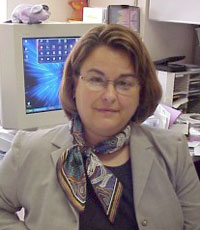 UNMC researcher Pascale Hammond Lane, M.D., talks about her work, life and interests.
UNMC researcher Pascale Hammond Lane, M.D., talks about her work, life and interests.
NOTE: This profile is part of a series highlighting the researchers who were named UNMC Distinguished Scientists for 2006. Each of these researchers will be profiled in UNMC Today leading up to a March 12 ceremony to recognize their achievements.
- Name: Pascale Hammond Lane, M.D.
- Title: Helen Freytag Distinguished Professor of Pediatrics, College of Medicine
- Joined UNMC: 1998
- Hometown: Springfield, Mo.
Describe your research in 25 words or less.
Examine reasons puberty unmasks or accelerates kidney diseases, especially diabetes, and the role sex hormones may play in this process.
How did you decide to pursue this area of research?
I wondered why puberty was bad for the kidney. The wisdom of the day was that kids “outgrew” their kidneys at that age, but kids with reduced kidney function don’t grow well, and kids with diabetes did not yet have reduced function. Some said it was because teens with diabetes quit taking care of their diabetes as well, but I saw bad things happen to kids with good control. I wanted to know what the real reason was. I wanted to learn more.
When did you realize you were interested in research?
I have always loved science and my high school biology teacher arranged some projects for me. The experiments did not work but I still enjoyed asking questions and looking for answers. Then I got a job as a technician during college and my fate was set. I loved learning new things.
What are the greatest challenges in research today?
The primary challenge is obtaining the resources one needs. The current funding climate is such that established scientists have a huge advantage over newer investigators. As resources dry up, the traditional sources for smaller, newer labs often shift to more established programs. Those just starting out are most vulnerable and it takes a great deal of optimism and stubbornness to persist in the process. I fear that we may lose the next generation as they get frustrated with the funding process. This fear is especially true for physician-scientists because they always have other options that are more immediately rewarding.
It would be very difficult to name major scientific questions because there are so many! Frankly, the more we learn the less we know. I just came back from a series of meetings on hypertension. When I was in medical school, the renin-angiotensin system had a single active hormone, angiotensin II. Now, investigators have discovered that many “breakdown” products and intermediates in this system have effects and specific receptors with a variety of effects. Even stuff we think we have figured out is up for investigation.
Best advice for new researchers?
Persistence is the most important trait but reviewers often make valid points. Don’t be afraid to modify the course if necessary but don’t give up too easily.
When an experiment stalls, what drives you to continue on?
I love learning and I want to learn the truth. Generating new knowledge and communicating it is my goal in life.
Who has been your greatest teacher?
I have to say my parents who never discouraged me from pursuing science, as untraditional as it was at the time. The most important influence in my research career was Mary Hendrix, Ph.D., who is now at Iowa. She was director of the Pediatric Research Institute at Saint Louis University when I started my first faculty position and she guided me through the process of getting extramural funding.
Tell us about your family and hobbies outside the lab.
I am married over 20 years to James Lane, M.D., an endocrinologist at UNMC. We have two children. Jennifer just started at Point Park University in Pittsburgh. Our son, Tim, is in the eighth-grade at Kiewit Middle School. I love to read, especially mysteries and espionage novels, and I enjoy cooking creatively (as opposed to just getting something on the table fast before someone has to be driven somewhere).
Globally, describe the most notable research achievement ever?
How do you compare all of the knowledge and understanding that humankind has achieved through the ages? Everything achieved has been significant to someone at sometime. Some achievements may not seem important now, but in five years their meaning may be clear and more significant than anything we have yet achieved.
Clarify a common misconception about research?
At my 10th high school reunion, during my fellowship training, I told others that I was interested in academic medicine and a research career. They asked me what I had discovered. A “discovery” can really only be appreciated in retrospect, once the significance of a finding or series of findings is known. In the meantime, you experiment and publish seemingly esoteric papers, at least to the lay public, that represent “baby steps” of science. Only in the long-term can these baby steps become the giant leaps the public appreciates.
What would you tell a student interested in a research career?
Just do it! Academic medicine is the most interesting career in the world. When you do research, you learn things that nobody else knows and you shape the future of our knowledge. Even though the early years can be exasperating and long, research is still the best part of my job. I cannot think of anything else I would rather do.
List three things few people know about you.
- I sing and play handbells in choirs at my church
- I thought about getting another major in English because I loved reading and writing so much
- I can sew